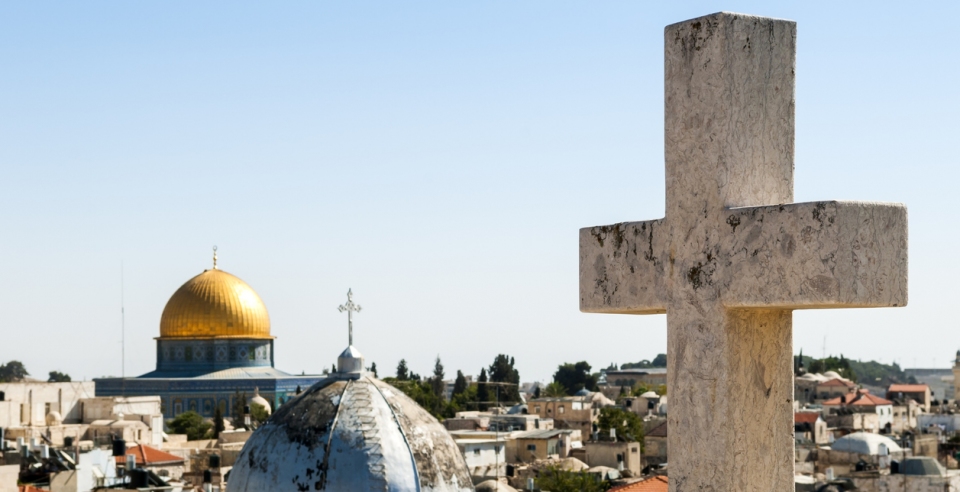Holy Land Reflections

I had the privilege of participating in a pilgrimage to the Holy Land sponsored by St. Bartholomew’s Church in New York City – May 17 – 27, 2023. I also had the pleasure of sharing this powerful experience with my son David who is the rector of the Church of the Heavenly Rest in Abilene, TX. There were 24 of us on this trip led by Bishop Dean Wolfe, Rector of St. Bart’s and our local tour guides, Canon Iyad Qumri and Rami Qumri. Iyad and Rami are Palestinian Christians with an extensive background and knowledge about the history, culture, geography, architecture, and politics of one of the most sacred and volatile places on earth. In addition to their knowledge and experience, Iyad and Rami also shared their personal stories and struggles of what it means to be Palestinian living in the modern state of Israel. We learned that the number of Christians in the Holy Land has declined precipitously over the last several years representing only about 2 percent of the total population. Many Palestinian Christians have left the area because of the political turmoil and the unrelenting restrictions on their personal liberties.
Holy and sacred places
Our home base was the Guest House at St. George’s Cathedral in Jerusalem, a short walk from the Old City where we enjoyed comfortable accommodations, great food, and the warm hospitality of Archbishop Hosam Naoum and his team. During our trip we toured and explored all the major religious sites central to our biblical narratives about the life of Jesus and his ministry – Bethlehem, Nazareth, Capernaum and of course Jerusalem. Many of these places are somewhat garish, especially the Church of the Holy Sepulchre since they incorporate centuries of eclectic design and represent the traditions of their Latin and Orthodox caretakers. Nonetheless, they are holy and sacred places where pilgrims have prayed and worshiped through multiple historic epochs and empires including the Romans, Byzantines, Persians, and Ottomans. Some of the most powerful experiences for me included the celebration of the Eucharist overlooking the ancient road to Jericho, renewing our baptismal vows at the Jordan River, and walking the Stations of the Cross in the footsteps of Jesus on the Via Dolorosa.
we toured and explored all the major religious sites central to our biblical narratives about the life of Jesus and his ministry – Bethlehem, Nazareth, Capernaum and of course Jerusalem. Many of these places are somewhat garish, especially the Church of the Holy Sepulchre since they incorporate centuries of eclectic design and represent the traditions of their Latin and Orthodox caretakers. Nonetheless, they are holy and sacred places where pilgrims have prayed and worshiped through multiple historic epochs and empires including the Romans, Byzantines, Persians, and Ottomans. Some of the most powerful experiences for me included the celebration of the Eucharist overlooking the ancient road to Jericho, renewing our baptismal vows at the Jordan River, and walking the Stations of the Cross in the footsteps of Jesus on the Via Dolorosa.
One of the most eye-opening aspects of the trip was getting a firsthand look at the plight of the Palestinian people, especially since most of the holy sites are situated in the territory Israel seized after the 1967 war. I recognize and appreciate the need for Israel to maintain peace and security, as do every sovereign nation and people. I do question, however, some of Israel’s policies and tactics which create apartheid-like conditions that impact the daily lives of the residents of the occupied West Bank, whose families have owned homes and inhabited these lands for centuries. These include separation walls built right through neighborhoods and communities, burdensome travel restrictions for West Bank residents, intimidating armed guards everywhere, multiple checkpoints, illegal Israeli settlements on Palestinian land, and a stark contrast in infrastructure and amenities between Israel proper and the occupied territories. While there are no easy solutions to such complex issues, I do not think that there will ever be peace in the Holy Land without justice, dignity, and respect for all its inhabitants.
Being on the side of justice
During our time in Jerusalem, we had the opportunity to hear both Israeli and Palestinian perspectives on these historic and contemporary challenges. In response to a question about what we, as American Episcopalians, can do to help the situation, Ophir Yarden, our Jewish guest speaker, encouraged us to support our Christian communities and institutions in the land of Israel. He indicated that the absence of Christians in this conversation reduces the situation to a religious conflict between Muslims and Jews, rather than a political struggle to address the rights and responsibilities of different ethnic groups. Our Muslim speaker, Firas Amad, cautioned us against being either pro-Israeli or pro-Palestinian. Instead, he encouraged us to be pro-justice.
As I walked these holy places then, and as I reflect on my experience today, I am reminded of that poignant moment on the Jordan River, when all of us renewed our baptismal commitment to strive for justice and peace among all people, and to respect the dignity of every human being. As I ponder my Holy Land observations and memories, I find the text to the well-known anthem by the late English composer, Herbert Howells, to be especially timely and appropriate.
O pray for the peace of Jerusalem.
They shall prosper that love thee.
Peace be within thy walls
and plenteousness be in thy palaces.
Photo insert: Top left: Eucharist in the Judean wilderness with Bishop Dean Wolfe Top right: Donald in a traditional Bedouin kafeya Bottom right: Donald at the Jordan River with Shola Omoregie, founder and COO of Africa Peace Support Bottom left: Renewal of Baptismal promises at the Jordan River with Fr. David Romanik, Rector at Church of the Heavenly Rest in Abilene, Texas